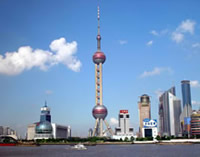|
|


ADVERTISEMENT
Buy Your own advertising
spaces!
.
Download Adobe Acrobat Reader to open [PDF] files.
Recent Visitors
The US Expo 2010 Pavilion Totters
2009. 8 May
(shanghaiscrap.com) Late yesterday afternoon Expo 2010 organizers announced that all national pavilion construction work must begin by June 30. Those who miss the deadline will not be allowed to build their own pavilions, and must instead seek space in a "standardized" pavilion or use a common pavilion. The statement didn't single out any particular country, but the target of this ultimatum is unmistakably the United States which, along with Andorra and Columbia, is the only country with Chinese diplomatic relations that has not confirmed for the Expo - and perhaps the only nation to have missed multiple fundraising and construction deadlines (set by itself, no less).
So how serious is this deadline and the tumult? On May 2, Frank Lavin, the US pavilion steering committee co-chairman, former ambassador to Singapore, and Undersecretary of Commerce, told the SCMP [subscriber only] that "the project [pavilion] was not expected to break ground before the end of the year." In other words, the US is - officially, charitably - five months behind the ultimatum with no plan to meet it.
So why the delay? According to the same SCMP story, the authorized US pavilion group has only raised $1.5 million of their $61 million budget.
The poor fundraising record only hints at the recent disarray and disagreements that have plagued the inexperienced US effort. In late March, Ellen Eliasoph, an authorized group co-chair, and wife to Ira Kasoff, the former Principle Commercial Officer at the US Consulate in Shanghai and current Deputy Assistant Secretary for Asia, told NPR that a loan from the Chinese government to pay for the entire US pavilion was "on the table." Apparently, this was news to Chinese government officials, who quickly denied it in the state media and - most recently - at a widely attended May 1 press conference. Eliasoph seems to have learned her lesson, and yesterday, in the Washington Post, she claims that the United States "isn't in the business of accepting Chinese money." Meanwhile, her co-chair, Frank Lavin, told the SCMP that he was unaware of "any talks" about a loan, period. Perhaps there wasn't a loan; or, perhaps, the US side wasn't supposed to talk about it. In either case, it's never good when the wife of a senior US government official concerned with Asia is repudiated in the state-owned media.
And it's not the only point of disagreement on fundraising that exists within the authorized group, either. Late last month, in two telephone calls for a story that I published in the Atlantic, co-chair Nick Winslow claimed that the "authorized" group had borrowed money from the Chinese government to pay for the pavilion design and site preparation work after it had run out of money (a story that Winslow has told to others). Then, today, in the same Washington Post story, the authorized group claims, instead, that a "Chinese construction company provided the funds for engineering work." It's worth noting that the Expo 2010 organizing committee is a branch of the Chinese government, and it maintains a list of "preferred" service providers, including a large number of state-owned construction firms. Presumably, a private firm isn't going to extend credit to a US non-profit that's shown itself incapable of raising money - unless somebody is guaranteeing the loan.
In any case, these are just two examples of the disarray that has alienated at least one potential major donor to the US pavilion effort (I have it on record) - and likely many, many more.
The hope among many Americans that the US pavilion would be financed by Americans is now unlikely to be fulfilled. Yesterday's announcement of a construction deadline was accompanied by the first (to my knowledge) announcement that the US State Department has authorized the US pavilion group to accept donations from foreign individuals and entities as well as US ones (Beatrice Camp, the US Consul General confirmed this last week for a soon-to-be-published story). What's the practical effect of this development? Most likely, it guarantees that the US that - if it gets a pavilion at all - will follow the precedent set at Expo 2005, in Aichi, Japan, where the US pavilion was largely underwritten by Toyota. So far, Dell and 3M have signed on as the US pavilion's only corporate sponsors; it'll be interesting to see how much longer they're going to want to be associated with what is quickly becoming a national shame.
[UPDATE: In response to a couple of emails - the authorized group, Shangahi Expo 2010, Inc., declined to answer any questions related to their bid when I contacted them last week. Those questions included a request that they disclose their current donors and creditor - foreign and US-based. Presumably, all of those entities are being screened by the State Department. Likewise, the State Department has refused repeated requests for comment.]
Source: http://shanghaiscrap.com

